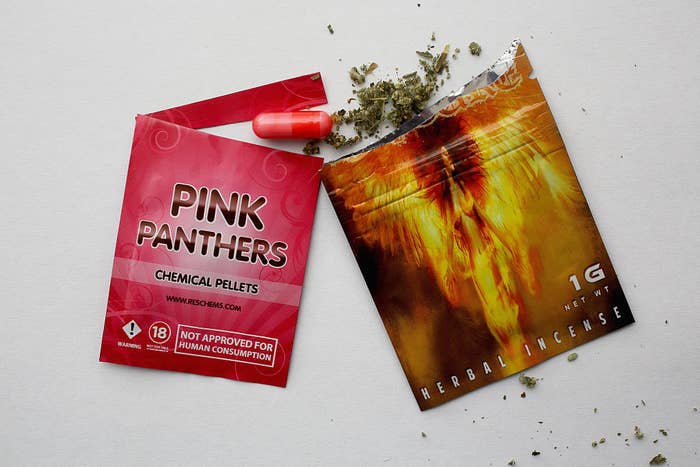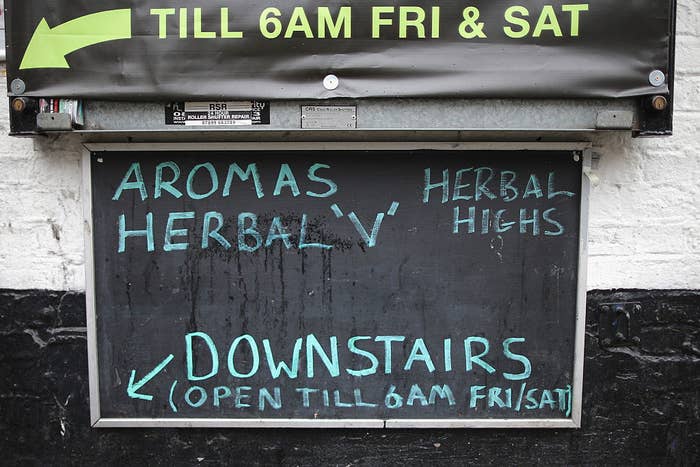
As of Thursday, the party is over. The government's Psychoactive Substances Act came into force at midnight, banning the sale and distribution of a whole range of drugs that were previously sold in high street shops and online.
The ban has been accused of forcing people to buy from the digital black market and charities have warned that vulnerable addicts could be harmed as a result.
It's an entirely new approach to drug legislation in the UK, so here's what you need to know:
So from today I could go to jail for taking legal highs?
Not for just taking and possessing them, no – possession for personal use remains legal.
The act targets the sale and distribution of new psychoactive substances (NPSs), the drugs formerly known as legal highs). So as long as you're not buying them in bulk to sell on, you should be fine.
The maximum sentence for selling, distributing, importing or making NPSs is seven years in jail.
But don't think this law is just for the dealers: Commander Simon Bray, the police officer leading UK forces' response to the new rules, says you could be charged with aiding and abetting if you buy from a UK seller.
And if you buy drugs from a foreign dealer online, you're participating in importing them and that could get you arrested.
It's unlikely that handing a bag of pills to your friend is going to be classed as dealing under the act, and the police have pointed out that the real purpose is to stop large-scale distribution.
Possession in prisons and detention centres is illegal, however.
So should I throw away my stash?
A lot of people spent the first half of this week stocking up on as much NPS as they could get their hands on. In the vast majority of cases police can't and won't seize this stuff or arrest people for consuming or possessing them, although they do have powers to do so if they think the law is being broken.
Police are keen to warn that taking synthetic drugs is dangerous. The substances are believed to have played a role in nine men in Rochdale falling ill in the last seven days, one of whom is in a critical condition.
Why are they not just controlled drugs, like cocaine and ecstasy?
In the last decade, successive governments have added more than 500 drugs to the list of controlled drugs, which are prohibited under the Misuse of Drugs Act 1971, which divides drugs into categories of seriousness. Possession of a class A drug such as heroin is a serious criminal offence.
Instead of that piecemeal approach, the government was keen to come up with a quick and simple way of stopping the legitimate trade of all NPSs, which have been blamed for deaths, violence, and some serious social problems.
The use of NPSs in prisons, for example, is a huge problem and responsible for at least 40 prisoner deaths between 2014 and 2015 and countless ambulance callouts and violent incidents. The law is partly a quick response to this.
Doesn't the law say that basically anything is an NPS? Even squirty cream?
The act was widely criticised – by scientists and opposition MPs – for its very vague definition.
It all comes down to whether something has the necessary qualities of psychoactive substances. The act says:
For the purposes of this Act a substance produces a psychoactive effect in a person if, by stimulating or depressing the person’s central nervous system, it affects the person’s mental functioning or emotional state.
This could obviously mean a lot of different things, including everyday household goods, but the key is whether the person who buys the stuff intended to get high with it somehow.
Home Office guidelines issued to retailers on how to stay on the right side of the new law say that cans of whipped cream that contain nitrous oxide (aka laughing gas) could indeed be defined as NPSs if the buyer intends to use them for mind-altering purposes rather than, say, to top an apple pie.
In short: It's an offence to sell something you know or suspect has psychoactive qualities to someone who is likely to use it to get high somehow.
How and whether the Crown Prosecution Service (CPS) would bring charges against a shop worker in such a scenario remains to be seen.

Er, but what about alcohol and nicotine? Aren't they mind-altering?
The government already thought of that, and the act specifically omits them. Also, poppers (alkyl nitrates) are not covered, because their effect on the brain was said to be "minimal", even though they are exactly the kind of thing the act was designed to prohibit.
Won't legal high trading just move to the Dark Web?
It's unlikely there will be an explosion in NPS trade through dark net markets (DNMs). If you speak to head shop owners, most of the people who regularly bought the stuff when it was legal were law-abiding people who have no interest in taking part in the digital black market. For many, the attraction of legal highs was that they were legal.
Getting access to DNMs is also a little bit fiddly for the average internet user, who may not know the first thing about secure browsers and Bitcoins.
It's safe to say, however, that NPSs are currently widely available across the Dark Web.
